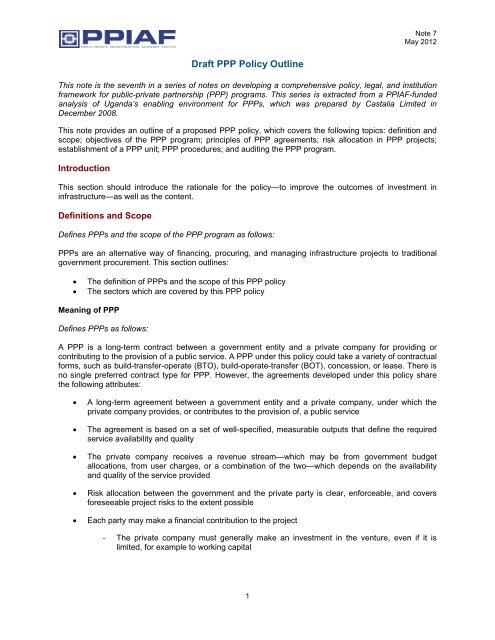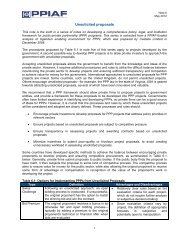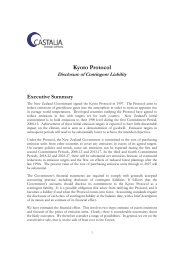PPIAF Draft PPP Policy Outline - Castalia
PPIAF Draft PPP Policy Outline - Castalia
PPIAF Draft PPP Policy Outline - Castalia
You also want an ePaper? Increase the reach of your titles
YUMPU automatically turns print PDFs into web optimized ePapers that Google loves.
<strong>Draft</strong> <strong>PPP</strong> <strong>Policy</strong> <strong>Outline</strong><br />
1<br />
Note 7<br />
May 2012<br />
This note is the seventh in a series of notes on developing a comprehensive policy, legal, and institution<br />
framework for public-private partnership (<strong>PPP</strong>) programs. This series is extracted from a <strong>PPIAF</strong>-funded<br />
analysis of Uganda’s enabling environment for <strong>PPP</strong>s, which was prepared by <strong>Castalia</strong> Limited in<br />
December 2008.<br />
This note provides an outline of a proposed <strong>PPP</strong> policy, which covers the following topics: definition and<br />
scope; objectives of the <strong>PPP</strong> program; principles of <strong>PPP</strong> agreements; risk allocation in <strong>PPP</strong> projects;<br />
establishment of a <strong>PPP</strong> unit; <strong>PPP</strong> procedures; and auditing the <strong>PPP</strong> program.<br />
Introduction<br />
This section should introduce the rationale for the policy—to improve the outcomes of investment in<br />
infrastructure—as well as the content.<br />
Definitions and Scope<br />
Defines <strong>PPP</strong>s and the scope of the <strong>PPP</strong> program as follows:<br />
<strong>PPP</strong>s are an alternative way of financing, procuring, and managing infrastructure projects to traditional<br />
government procurement. This section outlines:<br />
� The definition of <strong>PPP</strong>s and the scope of this <strong>PPP</strong> policy<br />
� The sectors which are covered by this <strong>PPP</strong> policy<br />
Meaning of <strong>PPP</strong><br />
Defines <strong>PPP</strong>s as follows:<br />
A <strong>PPP</strong> is a long-term contract between a government entity and a private company for providing or<br />
contributing to the provision of a public service. A <strong>PPP</strong> under this policy could take a variety of contractual<br />
forms, such as build-transfer-operate (BTO), build-operate-transfer (BOT), concession, or lease. There is<br />
no single preferred contract type for <strong>PPP</strong>. However, the agreements developed under this policy share<br />
the following attributes:<br />
� A long-term agreement between a government entity and a private company, under which the<br />
private company provides, or contributes to the provision of, a public service<br />
� The agreement is based on a set of well-specified, measurable outputs that define the required<br />
service availability and quality<br />
� The private company receives a revenue stream—which may be from government budget<br />
allocations, from user charges, or a combination of the two—which depends on the availability<br />
and quality of the service provided<br />
� Risk allocation between the government and the private party is clear, enforceable, and covers<br />
foreseeable project risks to the extent possible<br />
� Each party may make a financial contribution to the project<br />
- The private company must generally make an investment in the venture, even if it is<br />
limited, for example to working capital
- In addition to budget allocations for contracted payments, the government may make<br />
further contributions, such as providing, or enabling access to land, contributing existing<br />
assets, or providing debt or equity finance<br />
� At the end of the contract, the associated assets revert to government ownership.<br />
Scope of the <strong>PPP</strong> <strong>Policy</strong><br />
Defines the scope of this policy, as follows:<br />
This <strong>PPP</strong> <strong>Policy</strong>—and the responsibilities, procedures and rules outlined herein—applies to the<br />
procurement by a government entity of any project that fits the definition of a <strong>PPP</strong> in the previous section,<br />
and in addition has the following characteristics:<br />
� A capital investment requirement of greater than the local currency equivalent of USD 5 million<br />
� A contract duration of longer than 5 years.<br />
The <strong>PPP</strong> Unit can provide guidance on the applicability of this policy to a proposed project.<br />
Priority <strong>PPP</strong> Sectors<br />
Sets the sectors in which the government intends to use <strong>PPP</strong>s, as follows:<br />
The government intends to use <strong>PPP</strong>s for projects that provide infrastructure and infrastructure services.<br />
<strong>PPP</strong>s may be used to provide national public infrastructure and infrastructure services, and also to<br />
contribute to government infrastructure and accommodation. This includes the following sectors, from<br />
among which the <strong>PPP</strong> Unit may define short term priority sub-sectors:<br />
National Infrastructure—the fixed assets, networks, and facilities needed for the operation of the society<br />
and economy<br />
� Power<br />
� Water and sanitation<br />
� Transport fixed assets—roads, bridges, railroads, ports, airports—and public systems such as<br />
bus networks, rail rolling stock, and ferries<br />
� Telecommunication networks—local loop, exchanges, and backbone<br />
� Business support assets such as industrial parks or irrigation systems<br />
� Urban services such as street lighting and solid waste disposal.<br />
Government Infrastructure—the fixed assets, networks, and facilities needed for the operation of<br />
government<br />
� Government accommodation—physical buildings from which government services are provided,<br />
such as offices, prison buildings, hospital buildings, and school buildings<br />
� Government networks such as telephone or IT hardware—where these systems are not subject<br />
to rapid technological change.<br />
The government entities responsible for investment planning in these sectors should take into<br />
consideration the scope for using <strong>PPP</strong>s to achieve their policy objectives. The <strong>PPP</strong> Unit, described below,<br />
can provide support in assessing the potential for <strong>PPP</strong>s.<br />
2
Objectives<br />
<strong>Outline</strong>s the government’s objectives in pursuing <strong>PPP</strong>s and in creating a <strong>PPP</strong> framework, as follows:<br />
The government will develop <strong>PPP</strong>s in infrastructure with the following objectives in mind:<br />
� To increase the financing available for infrastructure by making use of private sector investment<br />
resources<br />
� To improve value for money in infrastructure projects by creating incentives for best-practice<br />
design, timely completion, and efficient operation by sharing project risk with the private sector<br />
� To encourage innovation in the provision of infrastructure<br />
� To improve the sustainability of infrastructure and infrastructure services<br />
� To improve accountability in public expenditure.<br />
The government should put a <strong>PPP</strong> framework in place to promote using <strong>PPP</strong>s to develop infrastructure<br />
where this is consistent with the objectives listed above. That is, to ensure <strong>PPP</strong> projects are developed<br />
which address policy priorities, and which have potential to be sustainable <strong>PPP</strong>s that represent value for<br />
money to the government or users. This <strong>PPP</strong> framework also aims to improve the execution of <strong>PPP</strong><br />
projects, by ensuring:<br />
� <strong>PPP</strong>s are well-structured, with risks allocated appropriately<br />
� <strong>PPP</strong>s are procured competitively, with appropriate information provided to bidders at each stage<br />
of procurement<br />
� <strong>PPP</strong>s are developed and implemented efficiently—for example, by reducing the complexity of<br />
coordination between government agencies, and by achieving the appropriate balance between<br />
in-house expertise and external advisory capacity.<br />
Principles of <strong>PPP</strong> Agreements<br />
Defines the principles by which <strong>PPP</strong> contracts will be structured, procured, managed, and reported as<br />
follows:<br />
Principles of <strong>PPP</strong> project design<br />
In designing <strong>PPP</strong>s to deliver the objectives outlined above, the government will adhere to the following<br />
principles:<br />
� Project specifications should focus on the end result—delivery of facilities or services at specified<br />
standards—rather than the inputs or means of delivery<br />
� Government payments to the private party, where required, will be based on the delivery of<br />
facilities or services consistent with performance standards that are clearly defined in the <strong>PPP</strong><br />
contract<br />
� User charges, where applied, will be specified in the <strong>PPP</strong> contract or subject to credible<br />
regulation<br />
� Where the services provided are paid for by user charges, the project cost may also be<br />
subsidized by Government, where such subsidies are consistent with the Government’s policy<br />
3
priorities. Payment of subsidies will be based on the delivery of facilities or services consistent<br />
with performance standards that are clearly defined in the <strong>PPP</strong> contract<br />
� The government may provide equity or debt finance to the project company—not exceeding 50%<br />
of the total equity or total debt respectively—where the government expects that such an<br />
investment increases the value for money of the project<br />
� The government may provide land or existing assets to the project company—this may be subject<br />
to payment of concession or lease fees to the government<br />
� Where land is to be acquired by the project company, the government may support this process<br />
by providing appropriate way-leaves<br />
� Project risk allocation will be clearly documented in the contract, and designed to deliver the best<br />
value for money from the project. Risk allocation principles are outlined in the following section of<br />
this policy.<br />
Principles of procedures for procuring and managing <strong>PPP</strong>s<br />
<strong>PPP</strong>s are a form of public procurement, so are subject to the principles of public procurement outlined in<br />
the relevant acts and legislation. <strong>PPP</strong> procurement principles should be as follows:<br />
� Procurement processes should promote transparency, fairness, and accountability<br />
� Procurement processes should maximize competition and seek to achieve value for money<br />
� Open bidding should be used and contracts should be awarded according to bid evaluation<br />
criteria published in advance in tender documents<br />
� Procurement must be non-discriminatory with respect to any criterion—to include race, religion or<br />
gender—not related to qualification. Participation may be limited on the basis of nationality in<br />
certain circumstances, and with the prior approval of the relevant authority<br />
<strong>PPP</strong>s generally involve some form of public expenditure—whether direct or contingent through provision<br />
of guarantees—and so should be managed consistently with the principles of the relevant acts of<br />
legislation for a country.<br />
Risk Allocation in <strong>PPP</strong> Projects<br />
Defines the principles by which <strong>PPP</strong> project risks will be allocated, as follows:<br />
A key principle of <strong>PPP</strong> projects is that project risk allocation should be clearly documented in the contract<br />
and designed to deliver the best value for money from the project. This does not mean transferring all risk<br />
to the private party, but allocating risk between the government and private parties appropriately.<br />
To deliver value for money, project risks will be allocated so that each party bears the risks they are bestplaced<br />
to manage. This means risks will be allocated to the party best able to:<br />
� Influence the risk factor, where possible<br />
� Influence the sensitivity of total project value to the risk factor—that is, to anticipate or respond to<br />
risk factor, if it cannot be influenced directly<br />
� Absorb the risk, where it can neither be influenced nor its impact controlled.<br />
The party to which a risk is allocated will have control over decisions related to the risk factor.<br />
4
The risks the government may bear or share, according to these principles, will vary from project to<br />
project. They may include, but are not limited to:<br />
� Regulatory risk—the risk that changes in law or regulations affecting the sector in which the<br />
<strong>PPP</strong> takes place will impact project value. Tariff risk is the most common regulatory risk—the risk<br />
that the entity responsible for setting tariffs will not uphold the level of tariffs needed for cost<br />
recovery<br />
� Demand risk—the risk that demand for the service is less than expected<br />
� Land acquisition risk—the risk that the project developer will not be able to acquire the land<br />
necessary to develop the <strong>PPP</strong><br />
� Land quality or environment risk—the risk that the quality of land or other environmental<br />
factors which are difficult to measure or predict—such as lake water levels—is different than<br />
expected, impacting the value of the project company<br />
� Foreign exchange risk—where project inflows are in a different currency to outflows, variability<br />
in the exchange rate will affect project value<br />
� Uninsurable force majeure risk—the risk that non project-specific events beyond the control of<br />
either party will occur. Some force majeure risks, such as earthquakes or floods, are insurable<br />
while others, such as acts of terrorism or war, cannot typically be insured.<br />
Where appropriate, the government will accept these risks through specific contractual agreements, such<br />
as take-or-pay contracts or guarantees. The government will not accept general project risk by providing<br />
loan guarantees to private sponsors of <strong>PPP</strong> projects.<br />
<strong>PPP</strong> Unit<br />
Introduces the <strong>PPP</strong> Unit and outlines its authority, reporting structure and mandate:<br />
� A <strong>PPP</strong> Unit [has been] established as the government’s centre of expertise in <strong>PPP</strong><br />
� <strong>Outline</strong>s the <strong>PPP</strong> Unit’s location and reporting structure within the Ministry of Finance<br />
� <strong>Outline</strong>s the <strong>PPP</strong> Unit’s mandate, as follows:<br />
The <strong>PPP</strong> Unit is mandated to support the development and implementation of good-quality <strong>PPP</strong>s which<br />
deliver the government’s objectives as outlined above. This mandate includes three broad roles:<br />
� Providing technical support to line ministries in identifying and developing <strong>PPP</strong> projects:<br />
- Helping line ministries and government entities identify <strong>PPP</strong> options—working with<br />
planning teams within each agency to identify where <strong>PPP</strong>s could be used to meet policy<br />
objectives and to prioritize these projects<br />
- Helping line ministries develop <strong>PPP</strong> projects, prepare for and conduct the transaction—<br />
the <strong>PPP</strong> Unit will form part of the team assigned to developing an approved project,<br />
preparing the transaction documents, and, subject to approval, conducting the <strong>PPP</strong><br />
transaction<br />
� Assessing and certifying <strong>PPP</strong> projects—the certification of the <strong>PPP</strong> Unit is required before<br />
investment is made in developing a <strong>PPP</strong> project. This certification will be based on the project’s<br />
accordance with the principles outlined in this policy and specific requirements to be developed in<br />
more detail by the <strong>PPP</strong> Unit<br />
� Developing and promoting this <strong>PPP</strong> policy and the use of <strong>PPP</strong>s within the country:<br />
- Periodically reviewing and proposing revisions to this <strong>PPP</strong> policy<br />
5
- Supporting relevant entities in developing sector-level <strong>PPP</strong> policies interpreting the<br />
principles outlined in this <strong>PPP</strong> policy<br />
- Developing guidelines on the procedures and requirements for developing and<br />
implementing <strong>PPP</strong>s in Uganda<br />
- Preparing standard documentation for <strong>PPP</strong> agreements<br />
- Promoting <strong>PPP</strong>s within and outside government—disseminating this <strong>PPP</strong> policy and<br />
educating stakeholders on the principles and benefits of the government’s <strong>PPP</strong> program.<br />
The <strong>PPP</strong> Unit’s role in the process of identifying, developing, procuring and monitoring <strong>PPP</strong>s is described<br />
in more detail in the section below outlining <strong>PPP</strong> procedures.<br />
<strong>PPP</strong> Procedures<br />
Defines the procedures for identifying, developing, procuring and monitoring <strong>PPP</strong>s. These procedures<br />
include the following steps:<br />
� Identify <strong>PPP</strong> project—line ministries with support of the <strong>PPP</strong> Unit<br />
� Develop business case—line ministries with support of external consultants. The required content<br />
of the business case should be defined fully by the <strong>PPP</strong> Unit in subsequent policy documents<br />
� Initially assess and approve business case—subject to <strong>PPP</strong> Unit certification, forwarded a<br />
development committee for approval to continue to project development stage<br />
� Develop <strong>PPP</strong> and prepare bid documents—project team comprising line ministry, <strong>PPP</strong> Unit and<br />
other sector body representatives as well as external consultants<br />
� Assess <strong>PPP</strong> and approve procurement—subject to approval the relevant committee, forwarded<br />
by Accounting Officer to Cabinet and Parliament<br />
� Procure <strong>PPP</strong>—project team, following a procurement process outlined in this policy and defined<br />
more fully by <strong>PPP</strong> Unit in subsequent policy documents<br />
� Monitor and enforce compliance with the <strong>PPP</strong>—line ministry; information provided periodically to<br />
<strong>PPP</strong> Unit to monitor overall performance of <strong>PPP</strong> program<br />
� Record and report <strong>PPP</strong> contractual information, performance and contingent liability stock—line<br />
ministry, Ministry of Finance, and <strong>PPP</strong> Unit<br />
Defines procedures for developing unsolicited proposals from private proponents, including:<br />
� Process for presenting <strong>PPP</strong> proposal to relevant government entities<br />
� Rewards available to company that initially proposed project that is successfully procured on a<br />
competitive basis, and requirements to be eligible for those rewards<br />
Summarizes responsibilities of each government entity in developing and procuring <strong>PPP</strong>s.<br />
Audit of <strong>PPP</strong> Program<br />
Defines the responsibility of the Auditor General to carry out value for money audits of the <strong>PPP</strong> program,<br />
and sets the timetable for these audits, as follows:<br />
In line with his responsibilities outlined in the relevant national legislation, the Auditor General will<br />
periodically carry out a value for money audit of the <strong>PPP</strong> program. This audit will take place every three<br />
years to evaluate whether the resources invested in the <strong>PPP</strong> program—such as in staffing the <strong>PPP</strong> Unit<br />
and in project development costs—are achieving the stated aim of improving the effectiveness of<br />
investment in infrastructure assets and services. External advisors will be contracted to provide<br />
appropriate expertise in assessing <strong>PPP</strong> project quality.<br />
6










